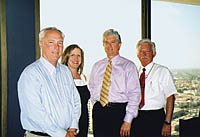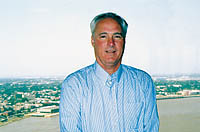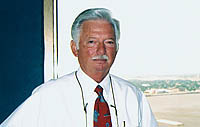

“I had an MBA and I was all Ivy League trying to do business,” he remembers. “It was going kind of rough. A customer grabbed me one day and said, 'You haven't gotten it yet, have you? Here's the order of life down here: Eat; Drink; Party; Work. If you want to reach level four, you have to pass through levels one, two and three.'”
While many in the rep business will tell you it pays to socialize with customers, in the Louisiana and Mississippi territory covered by Parks, Peyton & Sasser, it's a way of life.
“Do you live to work or work to live? Living comes first with these people,” Parks explains. “They really enjoy life. Relationships mean everything to them, and we embrace that.”
It isn't that people work any less hard in this area compared with anywhere else, but they do not live to work, he clarifies.
“We try not to worry so much about making good business deals as we do about building good business relationships,” Parks says.

Evolution Of A Rep Firm
The relationship between company principals Perry Peyton and Frank Parks started at Centenary College, a small Methodist college in Shreveport, La., where they played baseball together. After graduation, Parks went into business with the father of another friend, joining the Dallas-based rep firm Jim Burch & Associates. In 1976 Parks started Jim Burch & Associates of Louisiana with Jim's son Scott, and Peyton joined him there in 1977. They became part-owners of the company around 1979 and in 1989 changed the name to Parks-Peyton Inc.“A lot of manufacturers think bigger is better for a rep agency,” Peyton notes. “We started seeing the handwriting on the wall. We realized it would be hard for a one- or two-man shop to keep the lines we had or get new ones.” That's when Parks and Peyton started talking with industry veteran Bob Sasser about merging.
Sasser, now another principal in the firm, began his career as a water heater salesman for Rheem in 1970. In 1975 he went to work for a wholesaler, American Supply Co., based in Alexandria, La., where he was responsible for inventory management and purchasing. Sasser entered the rep business in 1983 as Bob Sasser Sales Inc., and in 1990 formed a partnership with Steve Williams as Sasser-Williams Sales. By August 2003 the company had disbanded and Sasser joined Parks-Peyton.
Of the various jobs he has held, Sasser says being a manufacturers rep is his favorite.
“Being a rep has been the most fun,” he says. “There have been some really good years and overall it has been the most rewarding, in relationships and financially.”
The company takes pride in its ability to survive over the years.
“In Louisiana our economy was not exactly diverse,” says Parks. “It was petrochemical/oil-based. When it all went down in the mid-1980s it was called the Oil Bust. People moved out. The most popular bumper sticker read: 'Last one to leave Louisiana turn out the lights.' We feel proud that we weathered the storm.”
The key to the company's perseverance has been its ability to continually change and adapt as circumstances warrant. That's what led to Sasser merging with the agency and it's also how Mary Kennedy, who handles inside sales and customer service, joined the firm.
In 1991 after moving to Shreveport, Kennedy spent eight years working for Red River Supply, a wholesaler.
“I was a customer of all these guys,” she says. “I knew Frank and Perry and was friends with Frank's wife, Lisa (who formerly worked for Parks-Peyton). My husband was head basketball coach at Centenary, the school where Frank and Perry met. When he got a job at Southeastern University of Louisiana, Perry called and suggested I work for them. By the time I left Red River, I was working in commercial sales, so it was an easy transition to come here.”
Other members of the staff include Sasser's wife, Sherrill, who helps with administrative duties, and Isaac Fort, a part-time college student who works for the rep firm in the bonded warehouse.
The PHCP industry experience and educational background of its three principals has helped the firm grow. Sasser has been in the business 35 years, while both Parks and Peyton have invested 27 years. Peyton and Sasser both earned bachelor's degrees, while Parks has a master's degree in business administration.

R-E-S-P-E-C-T For Reps
The wholesale job experience of two members of its six-person staff gives Parks, Peyton & Sasser a competitive edge. Both Kennedy and Sasser can approach the firm's wholesaler customers with an insider's view.“I had no idea what reps were protecting wholesalers from when I was at Red River,” Kennedy says. “The reps made it seem like anything I asked for was no big deal. I discovered when I asked a manufacturer for a favor as a rep I got a different response compared with when I had asked as a wholesaler. It took six months for me to get out of my wholesaler mode.”
Reps act as a buffer, Sasser notes. “Unfortunately, in some cases there is almost an adversarial relationship between the manufacturer and wholesaler,” he says. “We have to satisfy both sides somehow.”
Manufacturers reps are starting to get more respect, Parks says. “Our clients and customers can see how hard we are working. Look at it this way: say there is a city that owns golf courses. Some people in the City Council say that municipal golf courses are just an expense, but if they were smart, they would invest in them, fix them up and turn the whole thing into an asset-bearing, revenue-generating industry.
“The rep business is no different,” Parks continues. “Manufacturers worry about passing us a percentage, but we should be seen as assets. We go to the wholesaler and act as a buffer. Each side - wholesaler and manufacturer - worries that the other side is taking advantage of it. We work hard at bridging the gap.”

Relationships Build Loyalty
The agency's principals travel and work on establishing relationships with customers, Sasser says. “Many of them are really friends. When you visit a city that is 200 miles away, it's nice to know there are a few people there you can really look forward to seeing.”The South is not like some other areas of the country, where there may be seven million people within a few hours' drive and a rep can make 15 calls in a day, Parks notes.
“We have to drive a long time to cover our territory,” Parks says. “We spend a lot of time with people. I didn't want to wake up at age 65 or 70 and think, how did I use up my time? I knew I wanted to have friends if I was going to be in the business, get to know my customers and their families. It's a good way to do business.”
The rep firm has built strong bonds with its customers by showing interest in their lives and trying to understand their business, Sasser says.
“I try to see the other person's side, particularly if it is a customer,” he says. “I want to understand why the customer has a complaint. When I go to the manufacturer I can say what the problem is and how the customer feels. I try to treat customers as I would like to be treated. That means providing good service and seeing people on a regular basis.”
Like other rep agencies, Parks, Peyton & Sasser offers outings and trips to build loyalty, but the relationship building and trust established is more important, Peyton says.
“That other stuff is great, but if the customer doesn't like you or you don't understand his business, it doesn't matter how many trips you offer,” Peyton says. “People have to trust you.”
That means you have to be able to give the customer bad news, such as telling him that he has a credit problem, and that's one of the hardest things for a rep to do, he says.
“If you wait and the customer finds out on his own, that is much worse,” Peyton says.

Show Me The Money
One of the company's strengths is its ability to determine what its manufacturers want it to sell that will be most profitable for all concerned.“You can't make a living just by being friends with people; you have to convince the customer he will make money with you,” Parks says.
A rep has to look at the equation from both sides, so both the wholesaler and the manufacturer will benefit, he adds.
Parks, Peyton & Sasser has found that a mix of products including non-commodity items will generate higher profits.
“If a rep is driving around trying to sell a truckload of round toilets or 4-inch PVC DWV (drain, waste and vent fittings), the manufacturer won't make much money,” Parks points out. “We take pride in knowing we're not just going after the volume, but getting a profit for our manufacturer. We go with mixed loads. For example, we have done a good job with vitreous china and PVC pipe.”
“We make more commission when we have a better mix,” Peyton says. “It's a good deal for everyone.”
Rep Warehousing
The rep firm had its own warehouse in 1976. “We had to have one for the lines we had,” Peyton explains. “Every day we went through a learning curve. A real rep works out of his car and doesn't have all the warehouse expense. You have to make money to pay for the warehouse.”When the oil industry bust began, the company felt it could not afford the warehouse so it leased the facility to others.
“Within six weeks we felt that we needed warehouse space again for certain lines,” Parks says. “We decided to use a bonded warehouse instead of operating our own.” The warehousing service is provided by people known by the agency's principals.
“We don't really touch the merchandise,” Parks says. “We are depending on someone else for service. It works well and is cost effective. It's a good method of going to market. We have a good relationship with our warehouse. They have served us well.”
The bonded warehouse is still a profitable venture, Peyton adds.
There are pros and cons to a rep firm operating a warehouse, Parks says. It gives the rep more control over the service level, but at the same time, it costs exponentially more in terms of equipment, phone lines, employees, shelving and other expenses.
“Some lines demand that you have your own warehouse,” Parks says. “If the line is profitable enough, then you bite the bullet. If a rep is going into the warehousing business, it's important to support it with multiple lines.”
Wholesalers have differing views of reps with warehouses. “Some wholesalers think it's wonderful that we have inventory and they end up using our warehouse,” Parks says. “Others see our warehouse as a negative, saying that we are supporting their smaller wholesale competitors, helping them stay in business.”
A rep should think long and hard before going into the warehousing business, he advises. “Make sure your incremental income will be two to three times more than you think your expenses will be. Also remember, a rep with a warehouse has to protect the wholesaler. Practice volume pricing. Don't give the little guy who barely pays his bills the same kind of pricing as a big-hitter customer.
“In a perfect world, the rep would not have a warehouse but would just make money off commission,” Parks says. “Liabilities are much larger with a warehouse.”
Eventually the firm may choose to open its own warehouse in a more strategic location, such as in southeast Louisiana, Sasser says.
Supply Chain Rules
Parks, Peyton & Sasser sells only to wholesalers, not to contractors.“We do it by the book,” Parks says. “We represent the manufacturer. The manufacturer wants us to sell to people who will resell. We won't do it any other way. How can we ask distributors for their loyalty and business and then go behind their backs and sell direct? We would rather do what is right than make a lot of money.”
There are reasons for the current chain of distribution, he asserts. The middleman exists for greater efficiency. A good network of distribution is more productive and cost-effective.
As a Southern-based rep firm, Parks, Peyton & Sasser can provide a unique insight into the market for its Northern-based manufacturers, Parks says. “The reason they have a rep is so we can help them do business in the territory. We know how to take them to market here. In the South, we approach life a little differently. There is a Southern style to how we talk to our customers and how we provide them with data.”
House Calls
Parks, Peyton & Sasser's commitment to serving its customers extends beyond the manufacturer and wholesaler to include the contractor and even the homeowner or commercial building owner. Here's a scenario that happens fairly often: A wholesaler customer calls the rep firm and asks one of its people to visit a homeowner who has a complaint about a plumbing product.“Often it's a complaint about why the new toilet doesn't flush as well as the older version,” Parks explains. “We'd like to just say, 'We did not do the installation and we are not plumbers. Call a plumber.' But if we do that, we will anger the plumbing contractor - who will then badmouth us to the wholesaler - and/or the wholesaler, who will accuse us of not supporting our products.
“So we go visit the homeowner and try to be of service. We spend an exorbitant amount of time in people's homes and at commercial sites, trying to help with issues that are not easy for us to solve. We do it out of necessity, almost as a public relations effort, to make the wholesaler and contractor look good in the eyes of the homeowner,” Parks says.
These homeowner and commercial site trouble-shooting visits take time away from other tasks the manufacturer and wholesaler expect the rep firm to do for them, he notes.
“We know of plenty of reps who tell us we're crazy to do this type of thing, but we feel it is a service we are performing for the wholesaler, contractor and homeowner,” Parks says. “We don't get any kudos for doing it, but instead get flak over the time we are unable to spend on our traditional duties.”
Still Growing
Parks, Peyton & Sasser continues to grow. To date its territory has been limited to Louisiana and Mississippi, in spite of invitations to enter Texas.“We haven't accomplished what we want to do here,” Parks says.
Being active in the Association of Independent Manufacturers'/Representatives has helped this small rep company survive and expand, Parks says. Parks serves on AIM/R's board as senior vice president/industry and public relations.
“We participate in AIM/R for a myriad of reasons, but it started as a desire to retire with more than just money - with the thought that we had contributed to the overall good of the industry,” Parks says. “Discovering the quality of people I have met and worked with in AIM/R has made me feel proud of my profession.
“We have been able to meet people like Karl Grabowski, Bill Godwin, Bill Freeman, Dick Falkenhagen and Mike Parham,” he continues. “I can go to the guys with the big agencies and ask for tips on how to get bigger. Funny thing is, some of them ask me how they can become smaller!”
Parks, Peyton & Sasser makes money for its customers and manufacturers, Parks says. “There are no college courses that teach Manufacturers Rep 101 or 102,” he notes. “We learn on the fly, or if we are extremely lucky, from someone willing to mentor. The rep industry needs more mentors.”
AIM/R has also helped reps form better partnerships with manufacturers, Peyton says. “Reps are being asked to do more while commissions are being reduced,” he says, adding that it's in dealing with that type of situation where AIM/R proves its worth.
“Reps are willing to do more for their manufacturers, but let's get paid for it,” Parks adds. “All of us live by a common philosophy. A business deal is only good if it is good for all parties involved. A relationship will persevere only if the wholesaler, manufacturer and rep are all happy.”
Sidebar: Company Overview
Headquarters: P.O. Box 1238, Hammond, La. (Each person on the staff works from a different location in order to more effectively cover the territory.)Employees: Six
Staff: Frank Parks, Perry Peyton, Bob Sasser, principals; Mary Kennedy, inside sales/customer service; Sherrill Sasser, finance/administration; Isaac Fort, warehousing.
Territory: Louisiana, Mississippi.
Product Categories: Industrial supplies, plumbing products, pipe-valves-fittings, and well supplies.
Customer Base: Plumbing and heating wholesalers; distributors of HVAC, PVF, municipal, waterwell, and insulation wholesalers.
Association Membership: AIM/R.
Lines Represented
American WhirlpoolBradford White Water Heaters
CPI - Durapex
Simpson-Duravent
Gerber Plumbing Fixtures LLC
(subsidiary of Globe Union Group)
Howell Metals
Jet Stream Plastic Pipe
Legend Valve
La-Co Industries Inc.
Nomaco K-Flex (Imcoa Insulation)
Quick Cut Cutters
Rockford Separators
Trim to the Trade
Vassallo Industries
